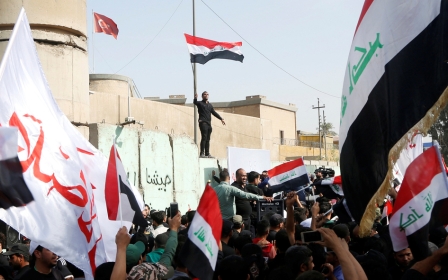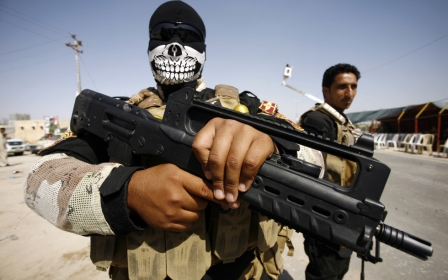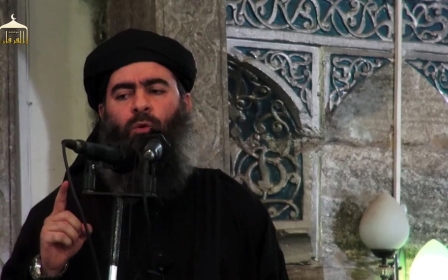Iraqi Shia armed factions reportedly resolve disputes ahead of elections
BAGHDAD - Prominent Iraqi Shia leaders led reconciliation efforts on Tuesday between the powerful cleric Muqtada al-Sadr and his rivals to defuse tensions and pave the way for a unified Shia political alliance ahead of the next parliamentary elections, senior Shia leaders said.
Over the past 10 years, new Shia militias have been formed, while other armed groups have split off from the Mehdi Army, the former armed wing of Sadr’s movement, including the prominent Asaib Ahl al-Haq and Kataib Huzballa-Iraq. These new organisation have challenged Sadr politically.
Since then, tensions between Sadr and his former allies have intensified amid rounds of fighting that have erupted dozens of times among their followers.
The fight against Islamic State (IS) group militants who seized almost a third of Iraq’s territories in June 2014 has kept Shia militias, which are backing government forces, engaged. However, as the pushback against IS draws towards an end with the battle for Mosul, fears of disputes resurfacing between armed Shia factions have been renewed.
The reconciliation between the Sadrist armed factions has sent assurances to Iraqis that anticipated Shia in-fighting may be delayed.
Televised footage broadcast by Sadr's office showed the cleric in his house in Najaf in a meeting with Abu Mahdi al-Muhandis, the top commander of the Popular Mobilisation Units (PMU), and Hadi al-Amiri, head of the Badr Organisation, a powerful paramilitary group and political party. Both men were in military uniforms and sat next to the cleric.
The PMUs, a coalition led by various Shia Iraqi militias, have played a major role in the government offensive against IS.
Qais al-Khazaili, commander of Asaib Ahl al-Haq and one of Sadr’s main political rivals, Akram al-Qaibi of al-Nujabaa, Adnan al-Shahmani of Ressaliun Brigades and other PMU leaders sat nearby. The men looked like they were involved in friendly talks at the gathering.
"The meeting was cordial and dominated by optimism. All the disputes were settled," Ahmed al-Assadi, of Jund al-Imam Brigade, told MEE. "Actually, this is a message for all to close the door in the face of enemies and rivals who may try to take advantage of these disputes [between Shia factions]."
Khazaili, Qaibi and Shahmani were prominent leaders in the Mahdi Army and remained close to Sadr until 2006, when they turned against him in protest against his push to centralise all decisions to his office.
The three men, in addition to many others, left the Najaf-based cleric to form the Asaib and Kataib militias, which carried out several deadly attacks against the US army in Iraq between 2007 and 2011.
Sadr had publicly criticised the militias, accusing them of being involved in sectarian killings and kidnappings in Baghdad and other provinces.
Tuesday's reconciliation talks, which lasted for more than three hours, were the first meeting between Sadr, Khazaili and Qaibi since 2006.
Previous efforts made to bring the three leaders together were aborted by Sadr. Sources involved in the meeting told MEE that "the men discussed all the disputed issues, including their visions for the future of Iraq and how to protect it from any foreign attacks".
"The session was good, productive and brotherly … Everyone is working for the interest of Iraq and to liberate the land. All of us are supporting the Iraqi Army in Mosul and Anbar and everywhere," Sadr said in the televised news conference after the meeting.
"[Discussing the post-IS period] was one of the issues addressed during the meeting. We agreed on something for the future of Iraq after Daesh," Sadr added, using an Arabic acronym for IS.
Iraq after Daesh
Sadr expressed optimism and said he hopes that all concerns about Iraq after IS will be resolved in future meetings.
"As long as the army is capturing the land and leading the liberation battles, my biggest fears are gone," Sadr said.
Several of those who attended the meeting told MEE that Sadr was concerned with the role of armed factions after Mosul is recaptured by pro-government forces.
Sadr also discussed how to support the state and incorporate the PMUs in government security forces to make them "completely led by the government and submitting to formal military laws".
Two senior Shia commanders told MEE on the condition of anonymity that the reconciliation efforts were started months ago by Sami al-Masoudi, a prominent leader of the Islamic Shia party of Fadhila.
"The real goal is forming a big political bloc to participate the next election," one of the commanders said.
The Fadhila Party is also a split-off from the Sadr Movement.
"If they [the leaders of Fadhila party] succeed, this means the next biggest parliamentary bloc will be controlled by Sadr and the prime minister's post will be in his hand," a source said.
This article is available in French on Middle East Eye French edition.
New MEE newsletter: Jerusalem Dispatch
Sign up to get the latest insights and analysis on Israel-Palestine, alongside Turkey Unpacked and other MEE newsletters
Middle East Eye delivers independent and unrivalled coverage and analysis of the Middle East, North Africa and beyond. To learn more about republishing this content and the associated fees, please fill out this form. More about MEE can be found here.




